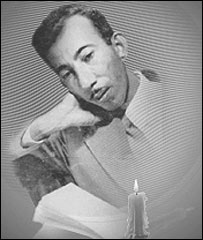
The Iraqi Poet Badr Shakir al-Sayyab
[Note: This is the eleventh in a series of translations of selected letters of the noted Iraqi poet Badr Shakir al-Sayyab. For more information on the poet, click here.]
Letter #11
My Dear Adunis, (1)
First of all, I hope you will forgive me for writing to you on this kind of paper. It is all I have in the house right now since I have just returned from night school. Perhaps you will now understand the reason why I have been tardy in responding to your letter. Working day and night does not give me any time to write.
I received the final version of your poem. I notice that you have paid attention to what I wanted to alert you to concerning the earlier version of the poem: namely, the excess use of rhymed paragraphs among those that are written in prose. Your poem that was published in the latest issue of “Shi’r†was more successful in this regard. Haven’t you seen how the versifiers have exploited free verse?
“On the sidewalk
A hungry man searching for a loaf of bread
The extended street is swelling with the crowds
Who are rebelling and roaring
Let the colonialists fall
Oh… let the colonialists fall. Etc…â€
If writing poetry without adhering to the meter becomes popular, you will then read and hear hundreds of poems that transform (Capital) and (Political Economy) and other similar books and editorials … into poetry. I swear upon my life that this is a grave danger.
Your poem was magnificent with all the images that it contained, but it had nothing else. However, is it the goal of the poet to show his readers that he is capable of generating hundreds of images? How do you compare this poem with your other poem, (Resurrection and Ashes)? In that great poem, you can see the idea as it grows and develops and you cannot omit any paragraph without losing the meaning of the whole poem. As for your last poem, even if you kept only one paragraph, you would not feel that any omission had occurred. There is no real growth or development in the meaning. Dear Friend, you are still influenced more by modern French poetry than by modern English poetry – the great poetry of Eliot, Sitwell, Dylan Thomas, Auden and others.
It is true that I have written a lot of poetry as Jabra (Ibrahim Jabra) has told you. I will publish the last poem that I have written in one of the Iraqi newspapers. You may read it and republish it in “Shi’r†if you see fit. There is no other way to get it out to you. The poem is entitled, “A Prophecy in the Year 1956.†I am not totally satisfied with it, but there is no one around to consult with. I am waiting for you to read it so I can hear your opinion. I have other poems: “To Jamila bou Hairad,†“Returning to Jaikur,†“Welcome Ghailan,†and “July in Jaikur.†Perhaps I will be able to send some of these to you in about a week when classes end.
Please convey my greetings to Yusuf (al-Khal) when you write to him. Also, please give my best to your distinguished wife, to Nathir (al-‘Athma) and his wife, to our brothers – Halim Barakat, Asaad Razouk, to Mrs. Salma (Khadra Jayyusi), to our great teacher, George Saidah, to Mrs. Edvik Shaibub, to Rafik Maalouf, and to the rest of the brothers and friends.
Badr
(1) It was sent undated. It was probably written towards the end of 1959.
[From the book, al-Sayyab’s Letters, by Majid al-Samurra’i, (Beirut: Al-Mu’assasa al-‘Arabiya li-al-dirasat wa-al-Nashr, Second Edition, 1994, p. 135) Translated from the original Arabic and with an introduction by George Nicolas El-Hage, Ph.D., Columbia University.]